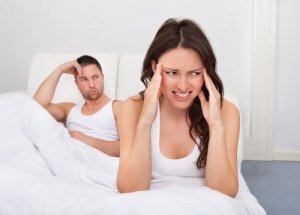The Relationship between Mental Health and Anorgasmia


Reviewed and approved by the doctor Maricela Jiménez López
Anorgasmia is a sexual dysfunction defined as the inability to have, or problems reaching, orgasm. It may occur in specific situations or in any situation with any sexual partner. Also, this dysfunction can happen due to physical or psychological causes. We’ll ask whether there’s a link between mental health and anorgasmia.
Mental health and anorgasmia
1. Anxiety disorder

The stress caused by the relentless pursuit of orgasm can make a person not fully enjoy sexual intercourse.
Anxiety is a mental state that shows itself as excessive anguish about a situation or thought that causes concern. An exaggerated concern generated by previous sexual experiences can lead to difficulty reaching orgasm.
Anorgasmia leads many people to consider intimate contact to be something stressful. They think that you have to have everything hyper-controlled and then get frustrated if they don’t reach the ultimate goal of orgasm.
Anxiety may be temporary, caused by a particular situation that prevents you from focusing on sex. However, if you’re concerned about not reaching orgasm during most intimate encounters and that prevents you from enjoying them, then you might have a problem you need to find the solution to.
In these cases, we recommend that you consult a mental health professional so that they can teach you techniques to control your excessive fear of not achieving orgasm.
2. Depressive disorder

The depressive state itself, as well as antidepressants, can affect sexual desire and even lead to anorgasmia.
Depression is a mental state characterized by deep sadness, low self-esteem, generalized loss of appetite, low mood, and loss of interest in everything.
Usually, depression decreases libido. It also leads to an absence of the first stage of desire. This means that the other sexual response stages don’t develop either. As a result, there can be difficulty reaching orgasm.
Additionally, some drugs prescribed for the treatment and control of depression, especially serotonin reuptake inhibitors, could make things worse. There is a link between them and a difficulty reaching orgasm, as well as decreased sexual desire. If this is happening to you, your psychiatrist will consider changing your medication. They may also adjust the dose in order to reduce its side effects.
Read more: Four Ways Depression Affects Your Brain
3. Low self-esteem and anorgasmia

Self-esteem affects the image you have of yourself and how you interact with others, including during sex.
We can define low self-esteem as the difficulty a person has to feel deeply valuable and worthy of another person’s love. This may adversely affect the enjoyment of intimate relationships, and, therefore, the chances of reaching orgasm.
Having self-esteem issues can affect almost every aspect of a person’s daily life. As a result, they can feel more insecure and, in some cases, reject any kind of contact.
A person with low self-esteem doesn’t enjoy sex, and this is why sexual encounters may cause anxiety and stress in them. In order to try to overcome these problems and enjoy a better quality of life, you should consult a professional. In addition, talk to your partner and express these difficulties to them so that you can feel safer during intimate contact.
This article may interest you: 7 Keys for Assessing Your Mental Health
4. Lack of communication between partners

If you don’t communicate as you should with your partner, you probably won’t talk to them about what pleases you sexually. This may affect the quality of your intimate encounters.
Lack of communication between partners can be due to many things. If you don’t feel relaxed or confident with your sexual partner, then it’ll be difficult for you to feel free to express your sexual preferences. As a result, you may not enjoy your sexual encounters.
Often, anorgasmia is caused by inadequate sexual stimulation. If you’re not able to talk to your partner about these types of problems, then it’s very unlikely that you’ll be able to reach orgasm.
Also, if you and your partners have other issues, then these are going to be reflected in your sexual encounters, as there may be tension due to unresolved situations, anxiety, dissociation, and loss of privacy.
In these cases, we recommend that you establish relationship habits to promote communication and mutual understanding. If this isn’t enough, it can be very beneficial to consult a specialist or go to couples therapy.
In short, there is a clear link between mental health and anorgasmia. Any situation that generates stress or anxiety can manifest itself during sex. This is why it’s very important to learn to take care of your mental health and devote time to self-care.
All cited sources were thoroughly reviewed by our team to ensure their quality, reliability, currency, and validity. The bibliography of this article was considered reliable and of academic or scientific accuracy.
- Kline, M. D. (1989). Fluoxetine and anorgasmia. The American Journal of Psychiatry, 146(6), 804-805. http://dx.doi.org/10.1176/ajp.146.6.804
- Farramola Bello, L. A., Erice Rivero, T. S., & Frías Alvarez, Y. (1982). Anorgasmia femenina como problema de salud. Revista Cubana de Investigaciones Biomédicas (Vol. 30). Ciudad de la Habana: Centro Nacional de Información de Ciencias Médicas, Ministerio de Salud Pública. Retrieved from http://scielo.sld.cu/scielo.php?script=sci_arttext&pid=S0864-03002011000300002
This text is provided for informational purposes only and does not replace consultation with a professional. If in doubt, consult your specialist.








